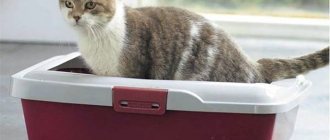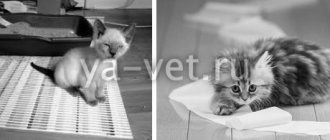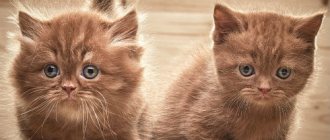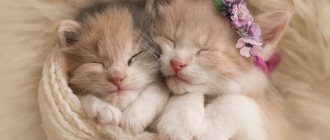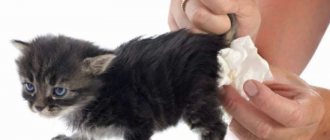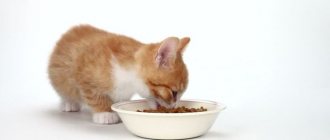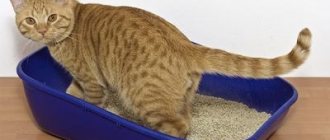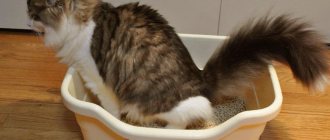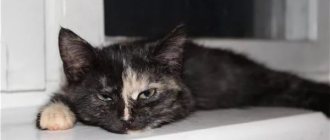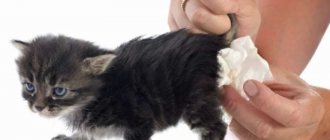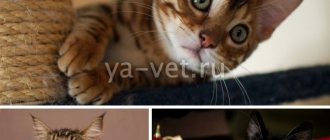Diarrhea in kittens can be a symptom of an infectious disease or indicate poisoning by toxic substances. An upset stomach causes rapid dehydration, which can cause your pet to die. Therefore, it is important to determine the cause of diarrhea as quickly as possible and begin treatment.
Let's find out what to do if a kitten has diarrhea, and how to cure it.
Causes of diarrhea in a kitten
Loose stools in a kitten can occur for various reasons. The most common one is mistakes when preparing a diet. Due to the immaturity of the digestive system, the pet’s stomach and intestines may react to a new or poor-quality product with vomiting or diarrhea.
Severe diarrhea is accompanied by infectious diseases of viral or bacterial etiology, as well as helminthic infestations. Diarrhea often occurs due to foreign objects entering the digestive tract.
Poor nutrition
This is the most common cause of diarrhea in kittens from 1 to 5 months of age. The digestive system of young animals is very sensitive, so diarrhea often occurs due to errors in nutrition.
The disorder can be triggered by the following factors:
- change of diet, sudden transition to new food;
- consumption of low-quality or prohibited products;
- overeating – the kitten’s stomach cannot cope with a large amount of food.
Infectious and invasive diseases
In case of infectious diseases, kittens experience not only vomiting and diarrhea, but also other symptoms:
- depression, lethargy;
- discharge from the eyes;
- temperature increase;
- cough;
- wheezing;
- runny nose;
- loss of appetite or complete refusal to eat.
Diarrhea is accompanied by dangerous diseases such as salmonellosis and panleukopenia. The prognosis for the treatment of these diseases is unfavorable.
Salmonellosis
Diarrhea in a small kitten 1-2 months old, which is accompanied by mucous vomiting and fever, may indicate infection with salmonellosis. With this disease, kittens also have other symptoms - cough, purulent discharge from the nose and eyes, and bloody inclusions may be present in the stool.
In kittens, salmonellosis is often complicated by bronchopneumonia.
Plague
Diarrhea in kittens under 3 or 4 months of age may be a symptom of panleukopenia. This disease is caused by a virus that affects the bone marrow, small intestinal mucosa and lymphoid tissue. Feline distemper develops rapidly and occurs with an increase in temperature to 41 degrees, vomiting, profuse diarrhea and apathy.
About 50% of animals die within a few days of infection.
Attention! Diarrhea in a 4-month-old kitten with panleukopenia is not dangerous if its mother has previously been vaccinated against feline distemper. In this case, her descendants have antibodies to the virus in their blood, and they will recover.
Worm infestations
Helminth infections are often accompanied by alternating diarrhea and constipation. Parasites that live in the intestines secrete toxins and injure its mucous membrane. Therefore, the animal experiences disturbances in the functioning of the digestive tract.
Diarrhea in a kitten may begin immediately after taking deworming tablets. This is how the intestines try to get rid of impurities.
Foreign body
Little kittens love to play with small objects - buttons, threads, Christmas tree rain and candy wrappers. If an animal ingests any of the above, vomiting and diarrhea are the most harmless things that can happen.
If a foreign object remains in the body, it can damage the walls of the small or large intestine as it moves through the digestive tract.
Other factors (allergy, stress, poisoning, vitamin deficiency)
The causes of severe diarrhea are not always associated with intestinal dysfunction. Diarrhea in a one-month-old kitten can even be caused by stress. If the bowel disorder began immediately after weaning from the mother or transferring the animal to a new owner, most likely it is associated with anxiety.
If a kitten has diarrhea, but there are no signs of an infectious disease, the animal did not overeat, the food did not change, it is worth taking into account other factors that could cause the disorder:
- allergy;
- avitaminosis;
- diseases of the gastrointestinal tract, for example, gastroenteritis;
- poisoning with toxic substances - household chemicals, plants;
- reaction to a vaccine or medication;
- change of teeth;
- benign or malignant neoplasms.
It is almost impossible to determine the exact cause of diarrhea without an examination. Therefore, it is important to show the kitten to a doctor. The clinic will take tests, do an ultrasound, and, if necessary, an X-ray of the abdominal cavity.
The veterinarian will compare the clinical picture and research data, make a diagnosis and prescribe treatment.
What are the symptoms of constipation in a cat?
Long-term (more than 2 days) retention of stool in a cat is a sign that you should contact a veterinarian. In this situation, there is no need to raise premature panic, but there is also no need to sit still. What especially aggravates the situation is that with prolonged blockage of the intestines and stomach, the cat may vomit, develop a fever, and develop general weakness. The animal may refuse activity and food, meow loudly and in every possible way signal the owner about the need to take active action.
What symptoms indicate constipation:
1) false urge to defecate, prolonged sitting in the tray with restless strutting;
2) plaintive meowing when trying to go to the toilet;
3) feces come out in small portions and have the form of dense balls or thin ropes;
4) traces of blood after defecation indicate damage to the intestines due to excessive effort;
5) bloating and gas;
6) hard belly and the animal’s refusal to be stroked in this area;
7) refusal of food;
 low mobility, apathy.
low mobility, apathy.
Observe your animal carefully. His behavior will definitely indicate the presence of additional symptoms.
How can the color of stool change during diarrhea?
Information about the color of stool and its structure will help the doctor when making a diagnosis. Types of diarrhea:
- Watery stools of normal color occur with a sudden change in diet, and also occur due to stress. If bowel movements occur 2-3 times, there is no reason to worry.
- Yellow stool indicates that food is poorly digested. Orange color of feces indicates problems with the liver or gall bladder. If yellow diarrhea occurs in a kitten not for the first time, it is advisable to diagnose the internal organs.
- Green liquid feces are a sign of dysbiosis and putrefactive processes in the intestines.
- Black diarrhea indicates internal bleeding in the upper digestive tract.
- White diarrhea is a sign of gallbladder dysfunction. Discolored stool indicates that little bile is being produced.
- Diarrhea with mucus and blood. A large amount of mucus in feces occurs with helminthiasis. Bloody inclusions in the stool appear due to inflammation of the intestinal mucosa, as well as due to damage to its walls by a foreign body. Bacterial and viral infections also cause bloody diarrhea.
What to feed a kitten with diarrhea
A hunger strike is a hunger strike, but you still need to feed the baby something. After a 12-hour break in nutrition, you need to start giving the baby food. If the kitten is small and very weak, you will have to feed it with a pipette or from a bottle.
The main task will be to prevent dehydration!
The transition to a normal diet (healthy!) is carried out gradually: you need low-calorie, low-fat food. It will be possible to feed the cat chicken broth, kefir, boiled eggs, rice porridge, and minced chicken, but not all at once on the same day.
If the condition worsens, the animal is taken to a doctor. If recovery is noticeable, then kefir is included in the diet. The diet is not changed for a while, only gradually adding other foods. Milk is completely excluded, as is fried, smoked, and fatty milk.
First aid
To stop diarrhea in a kitten, you need to eliminate its cause. Treatment at home is aimed primarily at preventing dehydration, as well as alleviating the pet’s condition.
The first thing to do if a small kitten has diarrhea is to put it on a fasting diet for 12 hours. The drinking bowl should be washed and filled with fresh water. With diarrhea, the body quickly loses fluid, so it is important to replenish its reserves.
If the kitten does not approach the drinking bowl, it must be soldered from a syringe without a needle with Regidron solution.
Attention! It is important to limit the contact of a sick animal with other pets to prevent them from becoming infected.
After some time there should be improvement. The normalization of the kitten's condition is indicated by increasing intervals between acts of defecation. Gradually, the liquid stool will acquire a mushy consistency. Then you can give the animal some food.
Veterinarians recommend feeding a kitten with diarrhea only therapeutic and prophylactic food, because it does not irritate the intestinal mucosa and is easily digested.
If the diarrhea does not go away, you can give the kitten one of the medications that help remove toxins from the body and normalize the intestinal microflora:
- Smecta. Dilute half the contents of the sachet in 100 ml of water. Give 3-5 ml 3-4 times a day.
- Enterosgel. Squeeze half a centimeter of gel out of the tube and dilute it in 20 ml of water. Give 3-5 ml three times a day.
- Bifidumbacterin. The contents of one bottle are diluted in 5 ml of water and given to the kitten to drink 2 times a day.
Attention! If home therapy does not produce results, and diarrhea continues for more than 1.5-2 days, a doctor should treat the kitten’s diarrhea. Perhaps diarrhea is one of the symptoms of an infectious disease.
What not to do
They often write on forums that Loperamide will help stop diarrhea when the kitten is squealing. However, in most cases this medicine can only do harm. This drug slows down peristalsis and reduces the frequency of the urge to defecate.
Diarrhea may indeed stop, but all toxins will remain in the intestines and will be absorbed into the blood. Due to severe intoxication, the kitten will feel even worse.
Do not give antibiotics to a sick pet without the advice of a veterinarian. Also, you should not give your animal vodka in the hope that it will kill the pathogenic microorganisms that caused the diarrhea. Alcohol can greatly aggravate a kitten's condition.
Diarrhea with vomiting
When, as a result of reflection, the contents of the stomach are thrown out through the oral cavity, we call it vomiting. It is evidence of irritation of the central nervous system - the signal came there from the stomach or intestines, most likely the problem is inflammation, which will be indicative in the presence of concomitant diarrhea.
When in doubt, you need to look at the animal carefully: coughing is different from vomiting. When coughing, the chest works, this is a rapid movement, and when vomiting, spasms of the abdominal wall are visible, the back can also arch, the action can be prolonged and repeated.
What to do for diarrhea and vomiting in kittens
First aid for diarrhea with vomiting is provided at home by the beloved owner. Vomiting greatly depletes the kitten’s strength; in combination with diarrhea, it quickly contributes to the disruption of the water-salt balance, which leads to recurrence of vomiting and loose stools, and it will not be easy to get out of the vicious circle.
The first step is to stop the vomiting. Metoclopramide with a dosage of 0.2-0.4 mg/kg helps with this; the drug can be used 3-4 times a day. This product is in the form of a solution for subcutaneous injection or tablets.
Symptomatic treatment is also carried out with tablets and solutions of ondansetron and dolasetron. Ondasetron is given twice a day at a rate of 0.5 mg/kg. Dolasetron is dosed at 0.6-1 mg/kg and given once.
Vomiting will be stopped by prochlorpromazine and chlorpromazine at a dosage of 0.1-0.5 mg/kg three times a day. Then they look for the cause of diarrhea and eliminate it by carrying out symptomatic therapy.
In what cases is it necessary to urgently consult a doctor?
It is necessary to go to the clinic if the animal received sorbents and was fasting, but the diarrhea does not go away. Other reasons to contact your veterinarian immediately:
- heat;
- vomit;
- depression, lethargy;
- symptoms of dehydration - dry mouth, pale gums, stringy saliva, sunken eyes;
- the presence of blood in the stool.
Treatment principle
The treatment regimen depends on the diagnosis. If salmonellosis is suspected, antibiotics are prescribed - Enteroseptol, Tetracycline, Fthalazol. The dosage is determined taking into account the kitten’s body weight.
The veterinarian may recommend giving your pet a weak solution of potassium permanganate. If there are obvious signs of dehydration, the animal is injected into a vein with a saline solution containing electrolytes.
If panleukopenia is suspected, diarrhea is treated symptomatically. The kitten is prescribed vitamins, glucose injections, and immunostimulants. It is recommended to take probiotics to restore intestinal microflora.
To prevent dehydration, Dufalight is prescribed, and in severe cases, Voluven in the form of injections is indicated.
In case of poisoning by poor-quality food, veterinarians use sorbents. Along with them, probiotics are prescribed. Feeding should be done in small portions so as not to put a lot of stress on the stomach and intestines. Drinking plenty of fluids is recommended.
Diarrhea, which is caused by helminthic infestation, is treated with anthelmintic drugs.
If a foreign body is detected in the intestines or stomach, surgical intervention is indicated.
